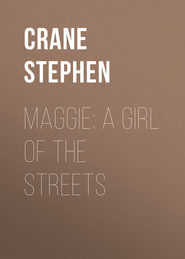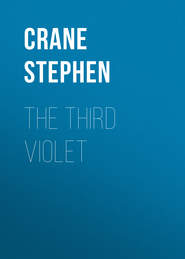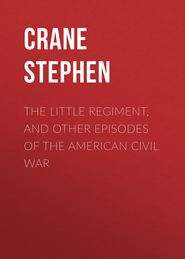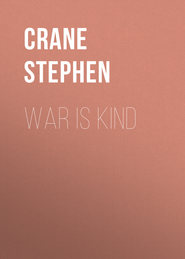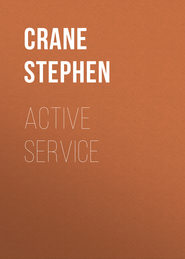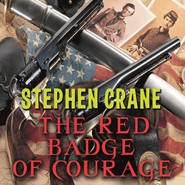По всем вопросам обращайтесь на: info@litportal.ru
(©) 2003-2025.
✖
The Red Badge of Courage: An Episode of the American Civil War
Настройки чтения
Размер шрифта
Высота строк
Поля
On the other side of the fire the youth observed an officer asleep, seated bolt upright, with his back against a tree. There was something perilous in his position. Badgered by dreams, perhaps, he swayed with little bounces and starts, like an old, toddy-stricken grandfather in a chimney corner. Dust and stains were upon his face. His lower jaw hung down as if lacking strength to assume its normal position. He was the picture of an exhausted soldier after a feast of war.
He had evidently gone to sleep with his sword in his arms. These two had slumbered in an embrace, but the weapon had been allowed in time to fall unheeded to the ground. The brass-mounted hilt lay in contact with some parts of the fire.
Within the gleam of rose and orange light from the burning sticks were other soldiers, snoring and heaving, or lying deathlike in slumber. A few pairs of legs were stuck forth, rigid and straight. The shoes displayed the mud or dust of marches and bits of rounded trousers, protruding from the blankets, showed rents and tears from hurried pitchings through the dense brambles.
The fire cackled musically. From it swelled light smoke. Overhead the foliage moved softly. The leaves, with their faces turned toward the blaze, were colored shifting hues of silver, often edged with red. Far off to the right, through a window in the forest could be seen a handful of stars lying, like glittering pebbles, on the black level of the night.
Occasionally, in this low-arched hall, a soldier would arouse and turn his body to a new position, the experience of his sleep having taught him of uneven and objectionable places upon the ground under him. Or, perhaps, he would lift himself to a sitting posture, blink at the fire for an unintelligent moment, throw a swift glance at his prostrate companion, and then cuddle down again with a grunt of sleepy content.
The youth sat in a forlorn heap until his friend the loud young soldier came, swinging two canteens by their light strings. "Well, now, Henry, ol' boy," said the latter, "we'll have yeh fixed up in jest about a minnit."
He had the bustling ways of an amateur nurse. He fussed around the fire and stirred the sticks to brilliant exertions. He made his patient drink largely from the canteen that contained the coffee. It was to the youth a delicious draught. He tilted his head afar back and held the canteen long to his lips. The cool mixture went caressingly down his blistered throat. Having finished, he sighed with comfortable delight.
The loud young soldier watched his comrade with an air of satisfaction. He later produced an extensive handkerchief from his pocket. He folded it into a manner of bandage and soused water from the other canteen upon the middle of it. This crude arrangement he bound over the youth's head, tying the ends in a queer knot at the back of the neck.
"There," he said, moving off and surveying his deed, "yeh look like th' devil, but I bet yeh feel better."
The youth contemplated his friend with grateful eyes. Upon his aching and swelling head the cold cloth was like a tender woman's hand.
"Yeh don't holler ner say nothin'," remarked his friend approvingly. "I know I'm a blacksmith at takin' keer 'a sick folks, an' yeh never squeaked. Yer a good un, Henry. Most 'a men would a' been in th' hospital long ago. A shot in th' head ain't foolin' business."
The youth made no reply, but began to fumble with the buttons of his jacket.
"Well, come, now," continued his friend, "come on. I must put yeh t' bed an' see that yeh git a good night's rest."
The other got carefully erect, and the loud young soldier led him among the sleeping forms lying in groups and rows. Presently he stooped and picked up his blankets. He spread the rubber one upon the ground and placed the woolen one about the youth's shoulders.
"There now," he said, "lie down an' git some sleep."
The youth, with his manner of doglike obedience, got carefully down like a crone stooping. He stretched out with a murmur of relief and comfort. The ground felt like the softest couch.
But of a sudden he ejaculated: "Hol' on a minnit! Where you goin' t' sleep?"
His friend waved his hand impatiently. "Right down there by yeh."
"Well, but hol' on a minnit," continued the youth. "What yeh goin' t' sleep in? I've got your–"
The loud young soldier snarled: "Shet up an' go on t' sleep. Don't be makin' a damn' fool 'a yerself," he said severely.
After the reproof the youth said no more. An exquisite drowsiness had spread through him. The warm comfort of the blanket enveloped him and made a gentle langour. His head fell forward on his crooked arm and his weighted lids went softly down over his eyes. Hearing a splatter of musketry from the distance, he wondered indifferently if those men sometimes slept. He gave a long sigh, snuggled down into his blanket, and in a moment was like his comrades.
Chapter 14
When the youth awoke it seemed to him that he had been asleep for a thousand years, and he felt sure that he opened his eyes upon an unexpected world. Gray mists were slowly shifting before the first efforts of the sun rays. An impending splendor could be seen in the eastern sky. An icy dew had chilled his face, and immediately upon arousing he curled farther down into his blanket. He stared for a while at the leaves overhead, moving in a heraldic wind of the day.
The distance was splintering and blaring with the noise of fighting. There was in the sound an expression of a deadly persistency, as if it had not began and was not to cease.
About him were the rows and groups of men that he had dimly seen the previous night. They were getting a last draught of sleep before the awakening. The gaunt, careworn features and dusty figures were made plain by this quaint light at the dawning, but it dressed the skin of the men in corpse-like hues and made the tangled limbs appear pulseless and dead. The youth started up with a little cry when his eyes first swept over this motionless mass of men, thick-spread upon the ground, pallid, and in strange postures. His disordered mind interpreted the hall of the forest as a charnel place. He believed for an instant that he was in the house of the dead, and he did not dare to move lest these corpses start up, squalling and squawking. In a second, however, he achieved his proper mind. He swore a complicated oath at himself. He saw that this somber picture was not a fact of the present, but a mere prophecy.
He heard then the noise of a fire crackling briskly in the cold air, and, turning his head, he saw his friend pottering busily about a small blaze. A few other figures moved in the fog, and he heard the hard cracking of axe blows.
Suddenly there was a hollow rumble of drums. A distant bugle sang faintly. Similar sounds, varying in strength, came from near and far over the forest. The bugles called to each other like brazen gamecocks. The near thunder of the regimental drums rolled.
The body of men in the woods rustled. There was a general uplifting of heads. A murmuring of voices broke upon the air. In it there was much bass of grumbling oaths. Strange gods were addressed in condemnation of the early hours necessary to correct war. An officer's peremptory tenor rang out and quickened the stiffened movement of the men. The tangled limbs unraveled. The corpse-hued faces were hidden behind fists that twisted slowly in the eye sockets.
The youth sat up and gave vent to an enormous yawn. "Thunder!" he remarked petulantly. He rubbed his eyes, and then putting up his hand felt carefully the bandage over his wound. His friend, perceiving him to be awake, came from the fire. "Well, Henry, ol' man, how do yeh feel this mornin'?" he demanded.
The youth yawned again. Then he puckered his mouth to a little pucker. His head, in truth, felt precisely like a melon, and there was an unpleasant sensation at his stomach.
"Oh, Lord, I feel pretty bad," he said.
"Thunder!" exclaimed the other. "I hoped ye'd feel all right this mornin'. Let's see th' bandage–I guess it's slipped." He began to tinker at the wound in rather a clumsy way until the youth exploded.
"Gosh-dern it!" he said in sharp irritation; "you're the hangdest man I ever saw! You wear muffs on your hands. Why in good thunderation can't you be more easy? I'd rather you'd stand off an' throw guns at it. Now, go slow, an' don't act as if you was nailing down carpet."
He glared with insolent command at his friend, but the latter answered soothingly. "Well, well, come now, an' git some grub," he said. "Then, maybe, yeh'll feel better."
At the fireside the loud young soldier watched over his comrade's wants with tenderness and care. He was very busy marshaling the little black vagabonds of tin cups and pouring into them the streaming iron colored mixture from a small and sooty tin pail. He had some fresh meat, which he roasted hurriedly on a stick. He sat down then and contemplated the youth's appetite with glee.
The youth took note of a remarkable change in his comrade since those days of camp life upon the river bank. He seemed no more to be continually regarding the proportions of his personal prowess. He was not furious at small words that pricked his conceits. He was no more a loud young soldier. There was about him now a fine reliance. He showed a quiet belief in his purposes and his abilities. And this inward confidence evidently enabled him to be indifferent to little words of other men aimed at him.
The youth reflected. He had been used to regarding his comrade as a blatant child with an audacity grown from his inexperience, thoughtless, headstrong, jealous, and filled with a tinsel courage. A swaggering babe accustomed to strut in his own dooryard. The youth wondered where had been born these new eyes; when his comrade had made the great discovery that there were many men who would refuse to be subjected by him. Apparently, the other had now climbed a peak of wisdom from which he could perceive himself as a very wee thing. And the youth saw that ever after it would be easier to live in his friend's neighborhood.
His comrade balanced his ebony coffee-cup on his knee. "Well, Henry," he said, "what d'yeh think th' chances are? D'yeh think we'll wallop 'em?"
The youth considered for a moment. "Day-b'fore-yesterday," he finally replied, with boldness, "you would 'a' bet you'd lick the hull kit-an'-boodle all by yourself."
His friend looked a trifle amazed. "Would I?" he asked. He pondered. "Well, perhaps I would," he decided at last. He stared humbly at the fire.
The youth was quite disconcerted at this surprising reception of his remarks. "Oh, no, you wouldn't either," he said, hastily trying to retrace.
But the other made a deprecating gesture. "Oh, yeh needn't mind, Henry," he said. "I believe I was a pretty big fool in those days." He spoke as after a lapse of years.
There was a little pause.
"All th' officers say we've got th' rebs in a pretty tight box," said the friend, clearing his throat in a commonplace way. "They all seem t' think we've got 'em jest where we want 'em."
"I don't know about that," the youth replied. "What I seen over on th' right makes me think it was th' other way about. From where I was, it looked as if we was gettin' a good poundin' yestirday."
"D'yeh think so?" inquired the friend. "I thought we handled 'em pretty rough yestirday."
"Not a bit," said the youth. "Why, lord, man, you didn't see nothing of the fight. Why!" Then a sudden thought came to him. "Oh! Jim Conklin's dead."
His friend started. "What? Is he? Jim Conklin?"
The youth spoke slowly. "Yes. He's dead. Shot in th' side."
"Yeh don't say so. Jim Conklin. . .poor cuss!"
He had evidently gone to sleep with his sword in his arms. These two had slumbered in an embrace, but the weapon had been allowed in time to fall unheeded to the ground. The brass-mounted hilt lay in contact with some parts of the fire.
Within the gleam of rose and orange light from the burning sticks were other soldiers, snoring and heaving, or lying deathlike in slumber. A few pairs of legs were stuck forth, rigid and straight. The shoes displayed the mud or dust of marches and bits of rounded trousers, protruding from the blankets, showed rents and tears from hurried pitchings through the dense brambles.
The fire cackled musically. From it swelled light smoke. Overhead the foliage moved softly. The leaves, with their faces turned toward the blaze, were colored shifting hues of silver, often edged with red. Far off to the right, through a window in the forest could be seen a handful of stars lying, like glittering pebbles, on the black level of the night.
Occasionally, in this low-arched hall, a soldier would arouse and turn his body to a new position, the experience of his sleep having taught him of uneven and objectionable places upon the ground under him. Or, perhaps, he would lift himself to a sitting posture, blink at the fire for an unintelligent moment, throw a swift glance at his prostrate companion, and then cuddle down again with a grunt of sleepy content.
The youth sat in a forlorn heap until his friend the loud young soldier came, swinging two canteens by their light strings. "Well, now, Henry, ol' boy," said the latter, "we'll have yeh fixed up in jest about a minnit."
He had the bustling ways of an amateur nurse. He fussed around the fire and stirred the sticks to brilliant exertions. He made his patient drink largely from the canteen that contained the coffee. It was to the youth a delicious draught. He tilted his head afar back and held the canteen long to his lips. The cool mixture went caressingly down his blistered throat. Having finished, he sighed with comfortable delight.
The loud young soldier watched his comrade with an air of satisfaction. He later produced an extensive handkerchief from his pocket. He folded it into a manner of bandage and soused water from the other canteen upon the middle of it. This crude arrangement he bound over the youth's head, tying the ends in a queer knot at the back of the neck.
"There," he said, moving off and surveying his deed, "yeh look like th' devil, but I bet yeh feel better."
The youth contemplated his friend with grateful eyes. Upon his aching and swelling head the cold cloth was like a tender woman's hand.
"Yeh don't holler ner say nothin'," remarked his friend approvingly. "I know I'm a blacksmith at takin' keer 'a sick folks, an' yeh never squeaked. Yer a good un, Henry. Most 'a men would a' been in th' hospital long ago. A shot in th' head ain't foolin' business."
The youth made no reply, but began to fumble with the buttons of his jacket.
"Well, come, now," continued his friend, "come on. I must put yeh t' bed an' see that yeh git a good night's rest."
The other got carefully erect, and the loud young soldier led him among the sleeping forms lying in groups and rows. Presently he stooped and picked up his blankets. He spread the rubber one upon the ground and placed the woolen one about the youth's shoulders.
"There now," he said, "lie down an' git some sleep."
The youth, with his manner of doglike obedience, got carefully down like a crone stooping. He stretched out with a murmur of relief and comfort. The ground felt like the softest couch.
But of a sudden he ejaculated: "Hol' on a minnit! Where you goin' t' sleep?"
His friend waved his hand impatiently. "Right down there by yeh."
"Well, but hol' on a minnit," continued the youth. "What yeh goin' t' sleep in? I've got your–"
The loud young soldier snarled: "Shet up an' go on t' sleep. Don't be makin' a damn' fool 'a yerself," he said severely.
After the reproof the youth said no more. An exquisite drowsiness had spread through him. The warm comfort of the blanket enveloped him and made a gentle langour. His head fell forward on his crooked arm and his weighted lids went softly down over his eyes. Hearing a splatter of musketry from the distance, he wondered indifferently if those men sometimes slept. He gave a long sigh, snuggled down into his blanket, and in a moment was like his comrades.
Chapter 14
When the youth awoke it seemed to him that he had been asleep for a thousand years, and he felt sure that he opened his eyes upon an unexpected world. Gray mists were slowly shifting before the first efforts of the sun rays. An impending splendor could be seen in the eastern sky. An icy dew had chilled his face, and immediately upon arousing he curled farther down into his blanket. He stared for a while at the leaves overhead, moving in a heraldic wind of the day.
The distance was splintering and blaring with the noise of fighting. There was in the sound an expression of a deadly persistency, as if it had not began and was not to cease.
About him were the rows and groups of men that he had dimly seen the previous night. They were getting a last draught of sleep before the awakening. The gaunt, careworn features and dusty figures were made plain by this quaint light at the dawning, but it dressed the skin of the men in corpse-like hues and made the tangled limbs appear pulseless and dead. The youth started up with a little cry when his eyes first swept over this motionless mass of men, thick-spread upon the ground, pallid, and in strange postures. His disordered mind interpreted the hall of the forest as a charnel place. He believed for an instant that he was in the house of the dead, and he did not dare to move lest these corpses start up, squalling and squawking. In a second, however, he achieved his proper mind. He swore a complicated oath at himself. He saw that this somber picture was not a fact of the present, but a mere prophecy.
He heard then the noise of a fire crackling briskly in the cold air, and, turning his head, he saw his friend pottering busily about a small blaze. A few other figures moved in the fog, and he heard the hard cracking of axe blows.
Suddenly there was a hollow rumble of drums. A distant bugle sang faintly. Similar sounds, varying in strength, came from near and far over the forest. The bugles called to each other like brazen gamecocks. The near thunder of the regimental drums rolled.
The body of men in the woods rustled. There was a general uplifting of heads. A murmuring of voices broke upon the air. In it there was much bass of grumbling oaths. Strange gods were addressed in condemnation of the early hours necessary to correct war. An officer's peremptory tenor rang out and quickened the stiffened movement of the men. The tangled limbs unraveled. The corpse-hued faces were hidden behind fists that twisted slowly in the eye sockets.
The youth sat up and gave vent to an enormous yawn. "Thunder!" he remarked petulantly. He rubbed his eyes, and then putting up his hand felt carefully the bandage over his wound. His friend, perceiving him to be awake, came from the fire. "Well, Henry, ol' man, how do yeh feel this mornin'?" he demanded.
The youth yawned again. Then he puckered his mouth to a little pucker. His head, in truth, felt precisely like a melon, and there was an unpleasant sensation at his stomach.
"Oh, Lord, I feel pretty bad," he said.
"Thunder!" exclaimed the other. "I hoped ye'd feel all right this mornin'. Let's see th' bandage–I guess it's slipped." He began to tinker at the wound in rather a clumsy way until the youth exploded.
"Gosh-dern it!" he said in sharp irritation; "you're the hangdest man I ever saw! You wear muffs on your hands. Why in good thunderation can't you be more easy? I'd rather you'd stand off an' throw guns at it. Now, go slow, an' don't act as if you was nailing down carpet."
He glared with insolent command at his friend, but the latter answered soothingly. "Well, well, come now, an' git some grub," he said. "Then, maybe, yeh'll feel better."
At the fireside the loud young soldier watched over his comrade's wants with tenderness and care. He was very busy marshaling the little black vagabonds of tin cups and pouring into them the streaming iron colored mixture from a small and sooty tin pail. He had some fresh meat, which he roasted hurriedly on a stick. He sat down then and contemplated the youth's appetite with glee.
The youth took note of a remarkable change in his comrade since those days of camp life upon the river bank. He seemed no more to be continually regarding the proportions of his personal prowess. He was not furious at small words that pricked his conceits. He was no more a loud young soldier. There was about him now a fine reliance. He showed a quiet belief in his purposes and his abilities. And this inward confidence evidently enabled him to be indifferent to little words of other men aimed at him.
The youth reflected. He had been used to regarding his comrade as a blatant child with an audacity grown from his inexperience, thoughtless, headstrong, jealous, and filled with a tinsel courage. A swaggering babe accustomed to strut in his own dooryard. The youth wondered where had been born these new eyes; when his comrade had made the great discovery that there were many men who would refuse to be subjected by him. Apparently, the other had now climbed a peak of wisdom from which he could perceive himself as a very wee thing. And the youth saw that ever after it would be easier to live in his friend's neighborhood.
His comrade balanced his ebony coffee-cup on his knee. "Well, Henry," he said, "what d'yeh think th' chances are? D'yeh think we'll wallop 'em?"
The youth considered for a moment. "Day-b'fore-yesterday," he finally replied, with boldness, "you would 'a' bet you'd lick the hull kit-an'-boodle all by yourself."
His friend looked a trifle amazed. "Would I?" he asked. He pondered. "Well, perhaps I would," he decided at last. He stared humbly at the fire.
The youth was quite disconcerted at this surprising reception of his remarks. "Oh, no, you wouldn't either," he said, hastily trying to retrace.
But the other made a deprecating gesture. "Oh, yeh needn't mind, Henry," he said. "I believe I was a pretty big fool in those days." He spoke as after a lapse of years.
There was a little pause.
"All th' officers say we've got th' rebs in a pretty tight box," said the friend, clearing his throat in a commonplace way. "They all seem t' think we've got 'em jest where we want 'em."
"I don't know about that," the youth replied. "What I seen over on th' right makes me think it was th' other way about. From where I was, it looked as if we was gettin' a good poundin' yestirday."
"D'yeh think so?" inquired the friend. "I thought we handled 'em pretty rough yestirday."
"Not a bit," said the youth. "Why, lord, man, you didn't see nothing of the fight. Why!" Then a sudden thought came to him. "Oh! Jim Conklin's dead."
His friend started. "What? Is he? Jim Conklin?"
The youth spoke slowly. "Yes. He's dead. Shot in th' side."
"Yeh don't say so. Jim Conklin. . .poor cuss!"






